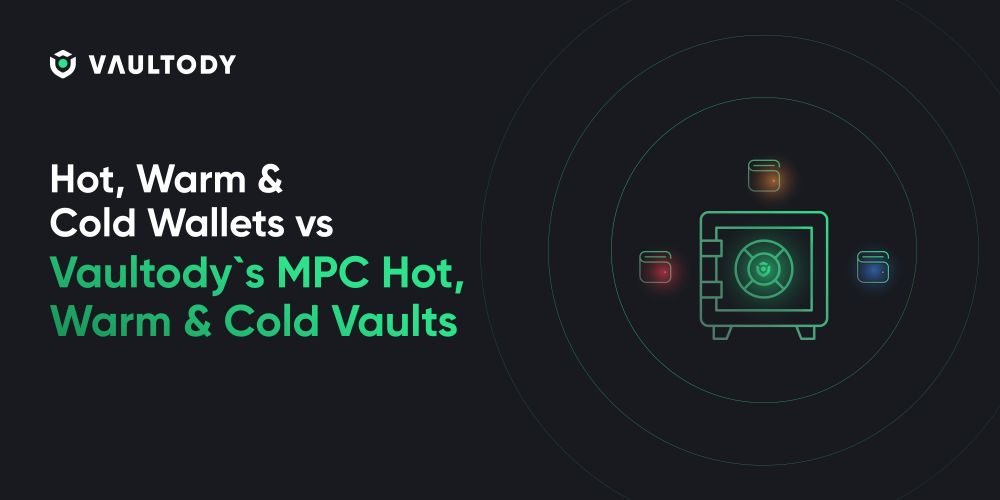Whether you're managing or involved in a business considering investments or operations requiring digital assets, it's essential to understand the available types of crypto wallets. Hot, warm, and cold wallets each offer distinct features, varying levels of complexity, security, and privacy. They play a pivotal role in facilitating your day-to-day or occasional crypto transactions and operations.
In simple terms, crypto wallets serve both individual and corporate purposes by facilitating interactions with blockchains and securing private keys in various ways. The method of private key ownership depends on whether the customer would like to keep and manage their MPC nodes on their side. This is where the three main wallet types distinguish themselves. For instance, opting for a hot cryptocurrency wallet means using an online-connected wallet, which offers high performance and efficiency but comes with associated risks due to its online nature.
On the other hand, selecting a cold wallet ensures the highest level of security as it remains entirely disconnected from the internet. However, this type of wallet sacrifices convenience, as it is more complex and time-consuming to operate with. The third type, the warm wallet, combines features of both hot and cold wallets. It maintains efficiency with an internet connection but adds a layer of protection through approvers` instead regular multi-signatures, requiring input from wallet users to sign and authorize transactions.
Standard Hot, Cold & Warm Wallets
Hot wallets, as mentioned earlier, require a constant internet connection, keeping private keys online for automated transactions without user intervention. This offers ease and speed in managing assets but poses a security risk as online private keys are the most vulnerable to theft by hackers. Private keys are kept in a single location which increases the risk of theft, and thus this can result in a single point of failure.
Designed for secure offline storage of private keys and funds, cold wallets prevent hackers from accessing them. Unauthorized access is possible only with physical access to the external hardware wallet and the correct passwords or PINs. However, they have limitations, including complexity and slow transaction creation time frame. Users must interact frequently to sign, prepare and broadcast transactions, with each transaction taking 1-2 days.
Warm wallets offer a middle ground between hot and cold wallets. They combine the transaction speed of hot wallets with security close to that of cold wallets, requiring user involvement to sign and broadcast transactions. Warm wallets are still connected to the internet, similar to hot wallets.
Depending on your trading style and objectives, cold wallets are ideal for secure, long-term asset storage. Hot wallets are best for quick daily trades with limited balances to optimize trades and prevent losses.
Vaultody`s Hot, Warm & Cold Vaults MPC Solutions
The hot, warm аnd cold wallets are known as vaults in Vaultody and they all utilize the multi-party computing (MPC) technology. All three wallets are specifically created to respond to the institutional needs and demands for exceptional security, flexibility, efficiency and scalability (and yes, this is attainable without any compromises on the security aspect). With the MPC technology in place, wallet owners have additional mechanisms to secure the funds, create and introduce custom rules to each vault, and set different transaction limits. Vault owners also have the opportunity to share split shards of private keys through different hosted nodes. MPC-powered wallets are also enabling upscaling not only all daily operations, but they provide an edge over standard hot, warm and cold wallets on the overall fund management processes. Some of the benefits include low transaction fee, it eliminates the single point of failure, and makes no exception and maintains the highest security standards.
Custom rules can be created and introduced to each one of the vault types, but should always be approved by the account owner. Transactions can also be created via APIs, harnessing the power of advanced API keys - this is inclusive of API keys having access to certain API endpoints. This ensures that we have mechanisms and features in place which guarantee smooth and secure interactions. To expand on the security aspect further, transactions that are created through the APIs are also driven by the transaction policy rules. Provided API keys are also restricting the access developers may have to make transactions on their own, or not allowing them to gain access to the xPriv key.
How Vaultody`s Hot, Warm & Cold MPC Vaults Work
To illustrate better how all three vault types can be applied in an organizational setting, we will provide an example. Imagine that company “XYZ” is using Vaultody for their funds management. The XYZ company has the flexibility to create as many custom rules as they wish, to make numerous vaults work for them as they desire. However, we are assuming the following scenario - XYZ needs to provide addresses to one of their vaults in order to conduct business with their clients. Another vault is needed to store their operating budget. The third vault will be used to secure and store their profit.
Vaultody`s hot vault will be ideal for the daily operations of XYZ, and since dealing with clients is one of their core business activities, the suitability of utilizing a hot vault is fully justified. One of the major differences between standard non-MPC wallets and MPC vaults is that in Vaultody we are solving all issues that persist in hot, warm and cold wallets. For instance, we are standardizing the required time to create a transaction, eliminating the risk of possible private key leakage.
In addition, Vaultody allows users to fully automate the transaction process, reducing the bottleneck caused by human interaction. In case you are enabling the fully-automated processing, you can provide limitless access to your developer(s) via our unified APIs.
The warm vault will be used for storing and managing the operating budget. The difference in the warm vault is that XYZ decided to introduce a rule which requires Level 1 team members to approve/reject transactions. Another difference is that there may be limited access via API keys - and this is happening purely for security reasons or it could be automated via API to request only approvals for certain transactions on demand.
Note that Level 1 approval/rejection rule can be applied to the hot vault as well, but since the importance of the operating budget is of higher priority than funds stored in hot vaults, XYZ requires Level 1 input only on transaction requests from the warm vault.
XYZ is also aware that at times the amounts that are used in hot vaults by clients can surpass certain daily limits, say $100,000 USD. When this happens, an automation rule is forwarding the amount that goes beyond the set limit into the warm vault, ensuring that higher value is kept in warm vaults than hot vaults. For example, if the daily amount equals $110,000 USD, $10,000 from the total will be automatically sent to the warm vault.
For securing the highest amounts of funds, XYZ is using a cold MPC vault - ideal for keeping the company's profit. The main difference between the warm and cold MPC vaults is that XYZ requires more strict approval from the company's team members. This means that If only Level 1 members were required to approve and reject transaction requests in warm vaults, Level 2 members must also approve and reject once Level 1 members have casted their votes.
Тhe MPC vaults cover all benefits with standard hot warm and cold wallets and minimize their weaknesses by providing multiple layers of security and technologies that guarantee smooth and seamless experience for our users. The single point of failure is completely eliminated through the fact that there is no single person that may leak the private key through the MPC technology, which is a technological advancement and evolution of standard hot, warm and cold wallets. If you are curious to learn more about the possible use cases for your business do not hesitate to reach out to our team.









 Copy link
Copy link